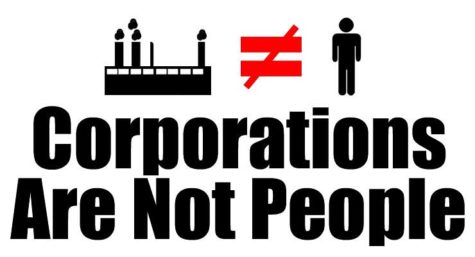Corporations and Social Movements: Profitability and Incentives in Corporate Decisions and Social Endorsements
Graphic of Corprate logos spelling out “Prisonrs of Corprate America” (Photo Courtsey of Creative Commons)
Some may feel as though everything in recent years has become a politicized issue. Everyone wants to know others’ political standpoints and opinions, from views on pronouns to social movements such as Black Lives Matter. But one perspective remains more sought-after than the others: brands and corporations.
People care about brands and corporation’s viewpoints on social issues because they want to purchase goods and commodities from companies that reflect their own opinions. While this is well-intentioned, it is meaningless as corporations’ public political standpoints are disingenuous.
As defined by Cornell Law, “A corporation is a legal entity created through the laws of its state of incorporation…The law treats a corporation as a legal ‘person’ that has standing to sue and be sued, distinct from its stockholders. ”

Although a corporation is lawfully and publicly viewed as being a sort of “legal person,” it has no actual autonomy or personhood due to a distinction from stockholders granting legal independence. The personhood of the corporation is only a front for shareholders. Therefore, a corporation’s public image is not reflective of executives’ actual opinions on current issues.
Corporations are affected by prevalent social issues such as inequality, war, or deprivation of resources that many around the world face in merely a monetary way, not one of direct physical impact. Despite a lack of direct impact to these corporations, their “taking a stand” in support of or against a movement or idea/controversy generates social relevance for them.
Many view corporations’ endorsement of current movements to have a net positive impact because they can promote an issue to a larger group of people. As social awareness of an issue grows, this spread of information can help alleviate the severity of current issues, however, a corporate decision to make a public statement and endorsement of ideas is not due to actual care for individuals harmed by these issues, but rather with the intention of keeping the corporation in the public eye. The incentive of this decision is motivated by calculated business moves to maintain profitability.
In business models, there is no room for the consideration of anything other than profit. Sustainability and other issues which many corporations may claim to consider are not actualized. The social and political stands from corporations are simply marketing decisions and strategies to maintain social relevancy and gain a consumer base. These decisions are made with the intention of generating greater potential profitability by taking advantage of consumers’ morals. Depending on the controversy endorsed, this action can make a brand more palatable to a new consumer. For instance, if a large group of people support a viewpoint, it only makes sense for a corporation to endorse this, as a consumer’s views and decisions directly impact corporate profitability. Even if this causes them to lose part of their current consumer base when the controversy dies down, they will most likely regain them or still have regular consumers who remained impartial to the conflict.
This is seen in the body positivity movement defined as “…a social, worldwide movement focusing on equality and acceptance for all body types and sizes. One of the goals is to challenge how our society, particularly all forms of media, presents and views the physical human body,” by physician Kristen Fuller.
This view is antithetical to corporations such as Victoria’s Secret whose previous branding was known for highlighting extremely thin models. The brand’s 2021 “inclusive rebranding” of “body positivity” makes most in favor of the body positivity movement skeptical considering the Victoria’s Secret Executive Ed Razeks 2018 comments stating that trans and plus-size women do not exemplify the “fantasy” that Victoria’s Secret is trying to sell.

“If you’re asking if we’ve considered putting a transgender model in the show or looked at putting a plus-size model in the show, we have,” Razek stated. “We invented the plus-size model show in what was our sister division, Lane Bryant. Lane Bryant still sells plus-size lingerie, but it sells a specific range, just like every specialty retailer in the world sells a range of clothing. As do we. We market to who we sell to, and we don’t market to the whole world. We attempted to do a television special for plus-sizes [in 2000]. No one had any interest in it, still don’t.”
So why the sudden change? As seen from Razek’s comments “we” refers to a board of Victoria’s Secret executives discussing marketing based on social palatability and how many are interested in a product or rebranding. As social awareness and support for the body positivity movement grew in the late 2010’s Victoria’s Secret began actively losing customers where the brand’s revenue continued to drop from a total of $5.4 billion in 2020 compared to $7.5 billion in 2019, and $8.1 billion in 2018.
This reinforces the corporate incentive to take a social stance or position based on the appearance of “progressive policy and branding”. Rather than having sympathy for the net harm their brand had created in the past, Victoria’s Secret’s decision to rebrand as inclusive and “body positive” can be attributed to a marketing tactic to regain a consumer base ensuring future profit.
Within these capitalist structures, corporate decisions to endorse a social movement or ideology will actively commodify it. An idea or movement is not a commodity in itself, but as the social value of an idea or movement increases, its ideology becomes synonymous with a product’s monetary value.
The commodification of social issues is a hindrance to substantial social progress. In a company, the executive’s decisions for social endorsements are based on the potential for future profitability where social movements and ideas become marketable objects. This occurs through mass social endorsement where the subversive potential of ideas is limited. Rather than the focus being on potential change or ways in which a movement’s ideas can bring help to affected individuals, these ideas become intertwined with brand deals and merchandise.
In the example of Justin Bieber’s “Racism is Evil” T-shirts, he marketed T-shirts with the statement “Racism Is Evil” with no other context or promotion of racial issues such as discrimination in the US. Nothing of substance was declared. If anything, this statement degraded other movements such as Black Lives Matter, as Bieber’s simplistic merchandise watered down the severity of racial issues. The issue of race in America on both an individual and institutional level is incredibly deep and complex, but when corporations and celebrities take the most surface level and basic stance, they can immensely profit off of it, without acknowledging the full scale of the issue or contributing to a positive change surrounding it

This limits the subversive potential for social movements and is a hindrance to the potential impact a social movement can generate. As consumers, we need to understand our place within these cycles. By feeding into these issues through the purchasing of products that seem to reflect our opinions and beliefs, we promote a brand and corporate profit over the actual issue. It is our responsibility to make an effort within our community to promote change.
Sofia Perrine is a senior and a returning staff member of the AGHS Eagle Times. Despite not considering herself much of a "writer" she finds journalism...










